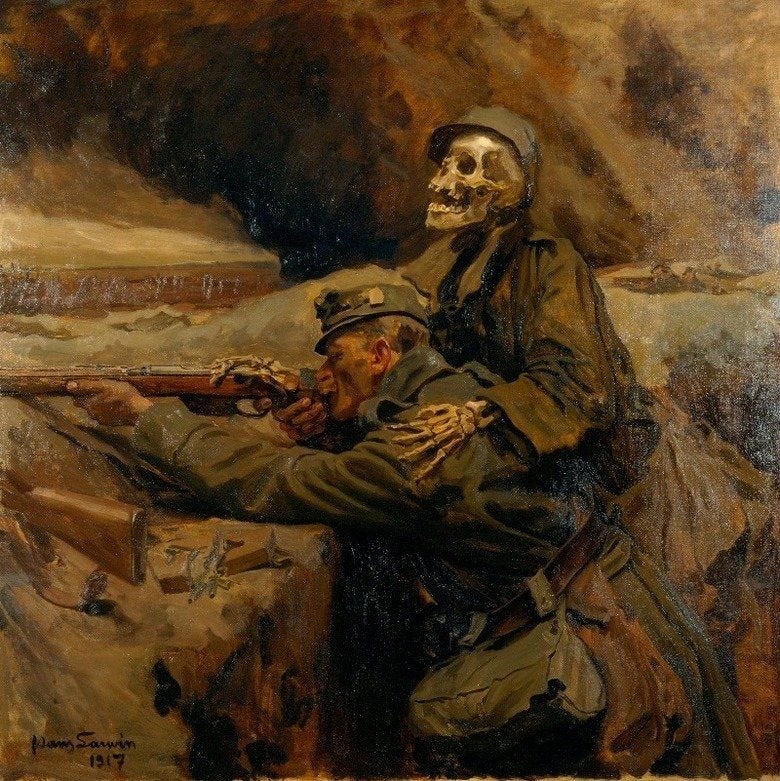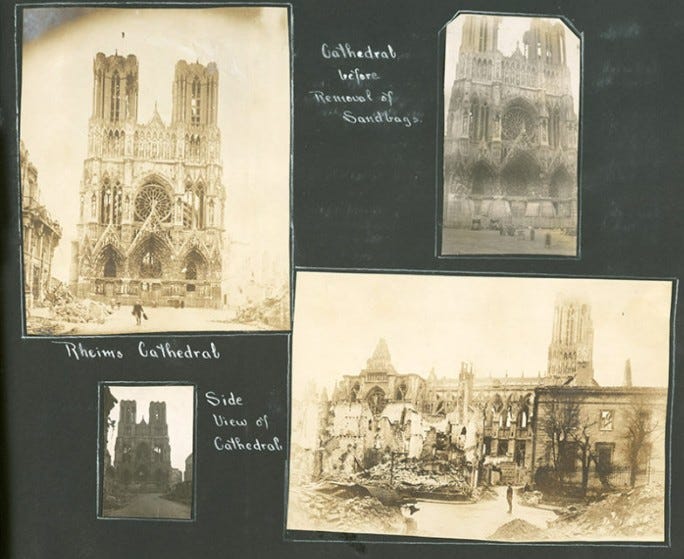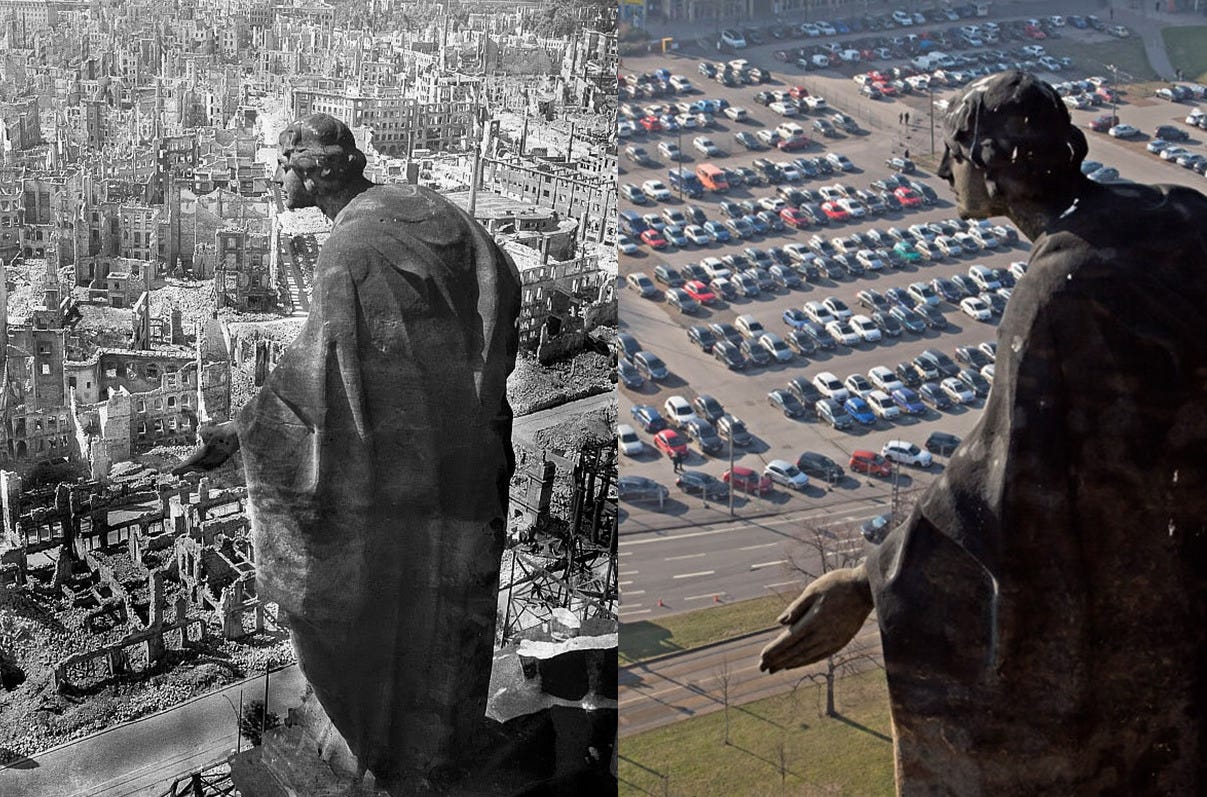Napoleon famously observed that every European war was essentially a civil war, a brutal clash among brothers rather than a conquest of strangers. Pat Buchanan captured a similar truth when he called Europe’s wars from 1914 to 1945 a slow-motion suicide. Europe was never truly conquered; it destroyed itself. What it lost went far beyond land or political influence. It lost its memory, its nobility, and ultimately its right to define its own destiny. To fully understand the European Civil War requires looking beyond treaties and battlefields into the spiritual devastation left behind.
Before 1914, Europe still bore the visible structure of an ancient and organic order. The continent was governed not by ideologues or bureaucrats, but by hereditary elites who understood their role as custodians of a legacy. Monarchs ruled by divine right and ancestral law, their legitimacy drawn not from abstractions but from lineage, land, and blood. The Habsburgs, Hohenzollerns, Romanovs, and Bourbons were more than rulers; they were incarnations of Europe’s civilizational memory. Their courts upheld a world where hierarchy was natural, where duty eclipsed desire, and where war, if waged, was bounded by custom and law.
Europe was not then a battleground of ideological systems, but a great family of nations, fractious yet fraternal, bound by shared origin and inherited forms. The European peoples—Latin, Germanic, Slavic—had been shaped by Christianity, chivalry, and the classical inheritance. Their wars, though many, were bracketed by the Westphalian order: war was waged between states, not peoples; peace was possible because the enemy was never treated as a criminal, but as a rival with a claim to honor.
Beneath this aristocratic world lay a spiritual unity. The concept of noblesse oblige reflected the warrior ethic of old: that power carries obligation, and that rule is justified only when animated by courage, sacrifice, and service to something higher than the self. This was the essence of European civilization. In Prussia, it manifested as discipline; in Austria, as imperial cohesion; in Russia, as mystical orthodoxy; in France, as gallant republicanism with monarchical residue; in Britain, as stoic duty tempered by irony. These were not contradictions, but variations of a single theme.
This order was not perfect, but it was alive. It preserved rank and meaning in a world before massification. It stood against the rising tide of the democratic, the technocratic, and the mercantile. It contained within it the remnants of the sacred, of throne and altar, of soldier and sage. The European civil war, when it came, would not merely destroy nations or borders. It would sever Europe from its memory, shatter its organic elite, and inaugurate a regime where money ruled, where history was a crime, and where nobility itself became suspect.
When the Great War arrived in 1914, it was not sparked by ideology, but by fraternal folly. A continent of cousins, bound by blood and history, blundered into a conflict without precedent. What began as a Balkan dispute metastasized into a total war that would level thrones, bleed aristocracies, and unleash demons no statesman could recall. The states of Europe had mobilized armies in 1914 believing in a short war of honor. What they received was mechanized slaughter, trench warfare, and the dissolution of every guiding certainty.
This was the first self-inflicted wound of the West. Never before had White nations arrayed their industrial might so ruthlessly against one another. The fruits of Western genius—chemistry, rail, artillery, telegraph—were turned inward. Europe, the mother of civilization, tore at herself with claws of steel and fire. The trenches of the Somme and Verdun were not merely graveyards of men; they were graveyards of meaning. The aristocratic code, the ethic of restraint, valor, and proportion, was drowned in mud and gas.
By war’s end, the old order lay in ruins. The Habsburgs, Hohenzollerns, and Romanovs were swept away, their crowns buried beneath nationalist passions and liberal dogmas. Revolution erupted in Russia, disorder spread across Central Europe, and even in the victors' camp, Britain and France, the cost was so great that victory became indistinguishable from defeat. The United States, untouched and ascendant, emerged not as a brother but as a creditor, bearing a messianic liberalism that mistook commerce for peace and democracy for civilization.
The Treaty of Versailles did not restore order. It enshrined revenge and destabilized what remained of the continental equilibrium. In crushing the defeated, it poisoned the future. The war had not settled anything. It had only laid the foundation for a more terrible reckoning. What made it a civil war in the deepest sense was not merely the shared ancestry of its participants, but the spiritual implications of the conflict. Europe had turned on itself, bled its best men dry, and opened the gates to a new ruling class unbound by honor, history, or nation.
What was lost in 1918 was not just territory or dynasties, but the authority of Europe’s memory. A world that once knew the difference between rule and tyranny, between order and efficiency, now stumbled toward a future governed by ideology, mass, and machine. The so-called "First World War" was not the end of history but the beginning of a long descent, a suicide begun in earnest.
Thus, the war of 1939 was not a sequel but a continuation. Europe, already crippled and humiliated, was pushed into a second conflagration it was no longer strong enough to survive. The ideologies that had risen from the ashes of 1918—Communism in the East, Liberalism in the West, and National Socialism in Germany—were not aberrations but expressions of a Europe torn from its roots, seeking salvation in new gods. The old harmony of peoples had been shattered. The fraternal struggle of 1914 had become a war of total systems.
In this second phase of the civil war, the West lost more than men and cities. It lost its soul. The struggle was no longer between rival nations of a shared civilization but between mutually annihilating visions of man, history, and power. The war brought about the complete inversion of Europe’s hierarchy. Monarchies had fallen in the first phase; now the aristocratic remnants of Europe’s old order were branded reactionary, criminal, or obsolete. The military vanguard of Europe’s old soul, the national idealists most willing to resist the global tide, were destroyed on the battlefield, hanged at Nuremberg, or exiled into silence.
Under the banners of democracy and anti-fascism, the victors laid waste to what remained of Europe’s independence. The Red Army spread over half the continent, installing client regimes that ruled by terror and fed on the wreckage of tradition. In the West, the United States imposed its own form of occupation, softer, subtler, but no less real. American money rebuilt the rubble, but the price was spiritual: re-education, moral disarmament, and a permanent place within a global consumer empire. In both East and West, the result was the same. Europe would never again command its own destiny.
This second war marked the final rupture between Europe and its aristocratic memory. The very concept of a sovereign nation rooted in culture and sacred duty was deemed the cause of the catastrophe. In its place rose an anti-Europe defined by universal rights, managed decline, and a pathological fear of strength. The victors rewrote the meaning of the war. It was no longer a tragedy of fratricide but a morality play. The dead were forgotten unless they served the new narrative. The victors’ justice was sacralized; the vanquished, demonized. Entire nations were taught to hate their own past.
The West’s second suicide completed the destruction of its civilizational immune system. Its cultural elite, once animated by history and faith, had been replaced by managers, accountants, and ideologues. The Church, which had once mediated between sword and scepter, was now an NGO in robes. The family was redefined, the borders opened, the schools poisoned, and the arts sterilized. With the warrior, priest, and poet removed, there was nothing left to guard the soul of Europe.
What began in Sarajevo ended in Dresden. The lights had not just gone out; they had been replaced by fluorescent illusions of progress. The so-called "Second World War" did not restore peace. It ensured submission. And what submitted was not a nation, but a civilization.
What followed 1945 was not peace, but occupation. The Third Reich had fallen, but so had Europe itself. What emerged was a continent subdued by American consumer liberalism and Soviet managerial communism, both alien to its organic traditions. In the East, Red commissars erased the ancestral, looted the sacred, and built a grey, lifeless parody of human community. In the West, Coca-Cola and the dollar replaced sword and cross. Both systems trained their subjects to forget. The final war, the war against memory, had begun.
The true horror of the postwar age was not material devastation, but psychological sterilization. Germany, the cultural and philosophical core of the continent, was crushed with ritualistic precision. Its cities were firebombed, its men slaughtered, its women defiled. Its past was criminalized, its future denied. And as Germany went, so too would all of Europe. What had once been Christendom, then civilization, was now redefined as a guilt-ridden open-air museum, a living sermon against itself.
The victors institutionalized a new moral order where remembering was treason. Schools taught self-contempt. Media celebrated inversion. Laws forbade defense. History was rewritten not to understand, but to condemn. Pride became pathology, loyalty became hate, strength became fascism. The European no longer saw himself as the heir of Pericles, Charlemagne, or Dante but as the perpetrator of world evil. What had once been the light of the world was made to crawl before the altars of its enemies.
This was not accidental. It was the necessary outcome of two world wars whose goal was not just the defeat of nations, but the eradication of Europe’s aristocratic essence. The ancestral order could not be permitted to return. A people capable of remembering who they were, bound to tradition and place, would pose a threat to the global order of finance, technology, and managerial control. To prevent resurrection, Europe had to be morally lobotomized, flooded with foreign masses, and entranced by toys.
Yet the civil war never truly ended. It changed form. Today it rages in the streets of Paris, the ruins of Detroit, the ghettos of Malmö, and the bureaucracies of Brussels. The invasion no longer comes from the east, but from within. The armies wear no uniforms. The weapons are not tanks, but television, immigration policy, and pharmaceutical sedation. The final phase of the war is spiritual and demographic, a war waged on the last remnants of Europe’s will to live.
But even now, memory flickers. There are those who remember the old order not as a fairy tale, but as a destiny. They gather its fragments, whisper its names, honor its heroes. In their veins runs the blood of men who once stormed the gates of heaven and built cathedrals from stone and courage. If the West is to be reborn, it will not be through policy or protest, but through a new elite forged in suffering, silence, and remembrance. The civil war has not ended because the soul of Europe is not yet dead.
Postscript – Points of Clarification
Here's the refined and properly ordered version of your Postscript, clearly formatted and leaving the original wording intact, with your requested adjustment:
Postscript – Points of Clarification
The opening line of this essay references a quote often attributed to Napoleon: "Every European war is a civil war." Whether apocryphal or not, the spirit of the phrase reflects his understanding of Europe not as a random collection of states, but as a civilizational whole—a family of nations bound by shared ancestry, faith, and historical memory. When Europeans take up arms against one another, they do not wage foreign wars, but acts of fratricide. The reference to Pat Buchanan was intentional, and carries a certain irony. As an American writing in the twilight of Western hegemony, Buchanan’s words reflect both a distant clarity and the unintended consequences of American power following 1945.
The framing of the First and Second World Wars as two phases of a single, continuous European civil war was most forcefully articulated by the German historian Ernst Nolte. A leading figure of the conservative revolution in historiography, Nolte viewed the years 1914 to 1945 as a civilizational cataclysm that destroyed Europe’s traditional order and inaugurated the modern age of ideological totalitarianism. For Nolte, the conflict was not simply military; it was metaphysical. It pitted competing visions of history, man, and society against one another within the European family. His concept has since been adopted and refined by figures such as Ernst Jünger, Dominique Venner, Patrick Buchanan, and countless others, each interpreting it through their own philosophical and national lens. This essay stands humbly in that tradition and owes much to those who had the clarity to diagnose Europe’s fall before the ruins had settled.
Though this essay focuses primarily on Europe proper, the cradle of Western civilization and the ancestral homeland of our people, the analysis has broader implications. The West is not confined to the European continent. It extends to all lands shaped by European settlement, spirit, and tradition: North America, Australia, New Zealand, Southern Africa, and beyond. These societies, though geographically distant, remain branches of the same civilizational tree. They too felt the shockwaves of the European civil war. The fall of Europe marked the beginning of their own decline—politically, culturally, and demographically. The deracination, moral disarmament, and demographic replacement that began in Berlin and Vienna found their echo in Boston and Vancouver, Johannesburg and Sydney. The conflict was European in origin, but global in consequence.
None of this is written out of nostalgia or despair. It is written in remembrance, and in defiance. To understand what was lost is the first step in reclaiming what might yet be restored. Memory is a weapon, and clarity a shield. If this essay has one purpose, it is to say: the war is not over, and Europe is not dead.
Weakness invites enmity, not because evil is all-powerful, but because nature abhors a vacuum. When a people and a civilization lose their confidence, their clarity, or their will to defend themselves, opportunistic forces—ideological, economic, or otherwise—inevitably move in to take their place. Think of a healthy body. So long as its immune system is intact, it can resist infection. But when the body is weakened, when its defenses falter, even a common parasite can become fatal. The parasite alone is not the cause; the failure of the immune system is. In the same way, no external force can hollow out a strong civilization unless that people first forget who they are, what they stand for, and why they deserve to exist. Monomania won't save us, strength will.








A sober, yet necessary article on how we got here. 👍
Poignant, but almost self-evident to those few scholars of history that see beyond the self-flagellation of modern academia, and see the spiritual treasure that was abandoned in that civilizational civil war.
The contradictions and errors of modern Eurocratic structure are pushing the continent further into irrelevance, and it will take toppling of those structures to renew the continent as a whole. Ancestral order is the only way back, but how do we achieve a renewal that won't simply be a facsimile and a parody of what was before? How do we bring ourselves to sincerity?